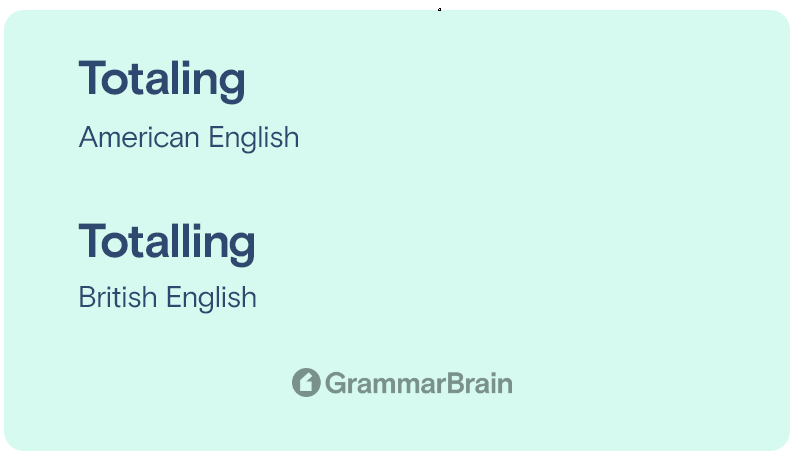Is it totalling or totaling? American and British English always manage to throw up words that confuse us with their subtle differences in spelling. While written British English usually contains the original spelling, American English tends to add or drop a letter or two. ‘Totaling’ and ‘Totalling’ are the same words, with the extra ‘l’ dropped in American English.
Before delving deeper into the difference between ‘Totaling’ and ‘Totalling,’ let us first look at them individually.

Source of Confusion between ‘Totalling’ and ‘Totaling’
Since both of these are the same word, they often lead a reader to wonder if one of them is incorrect. But both of them are totally (not a pun!) correct, and both spellings are acceptable.
The confusion started from early 20th century onwards when many such verbs ending in ‘l’ underwent a similar change in American English.
| Word | Spelling |
| Totaling | American English |
| Totalling | British English |
‘Totaling’ Meaning and Definition
‘Totaling’ is the American version of the word. Totaling is a verb which might mean one of two different things depending on use. It is the present participle form of the verb ‘total’. In the first case, ‘totaling’ means to ‘sum up’ or to add something up.
However, the second case is an informal usage of this verb, mostly used within the United States. Here ‘totaling’ means to wreck or demolish something beyond repair. Generally, the second application is in respect to vehicles.
‘Totalling’ Meaning and Definition
‘Totalling’ is the British spelling of the verb. According to Oxford Dictionary, the verb ‘total’ has two meanings. Since ‘totalling’ is the present participle form of this verb, it has the same meaning. The first meaning of ‘total’ is a quantity reaching a particular level after accumulation.
The Oxford dictionary elaborates this meaning as “total something to reach a particular total”. The second meaning is the mathematical addition of some quantity.
The Oxford Dictionary elaborates on this meaning as “to add up the numbers of something or somebody and get a total.”
Difference between ‘Totalling’ and ‘Totaling’ Usage in Sentences
1- When the verb means a quantity reaching a particular level after accumulation
British: The city’s skyline was hardly any clearer, despite the installation of smoke towers totalling more than a hundred.
American: As Izuku was punched in the face, he could see all the preparations he had done for the past six months totaling up to nothing in front of Bakugo.
2- When the verb means the mathematical addition of some quantity.
British: On totalling up the costs and matching them with expenses, Ramsay found out a huge mismatch, further giving fuel to his suspicion.
American: The statistician found out that totaling up the saves rather than the goals reflected a more accurate picture of the team’s travails.
3- When the verb means to wreck something beyond recovery. (Only used in American English)
American 1: “Drinking up that spirit”, remarked Samuel, pointing to the bottle, “Is the surest way to totaling your new car.”
American 2: Totaling his trailer after a fistfight, Sasha felt nothing but shame at his actions, even though the other guy received all the bruises.
Conclusion
So now that you are clear on what the difference between ‘totalling’ and ‘totaling’ is, how to remember which is which? Well, here is a quick trick to remember which spelling is British and which is American. As we know, Shilling is a British coin, and it contains ‘-lling’, quite like ‘totalling’. Remembering this will save you from any confusion that still lingers.
Inside this article
Fact checked:
Content is rigorously reviewed by a team of qualified and experienced fact checkers. Fact checkers review articles for factual accuracy, relevance, and timeliness. Learn more.
Core lessons
Glossary
- Abstract Noun
- Accusative Case
- Anecdote
- Antonym
- Active Sentence
- Adverb
- Adjective
- Allegory
- Alliteration
- Adjective Clause
- Adjective Phrase
- Ampersand
- Anastrophe
- Adverbial Clause
- Appositive Phrase
- Clause
- Compound Adjective
- Complex Sentence
- Compound Words
- Compound Predicate
- Common Noun
- Comparative Adjective
- Comparative and Superlative
- Compound Noun
- Compound Subject
- Compound Sentence
- Copular Verb
- Collective Noun
- Colloquialism
- Conciseness
- Consonance
- Conditional
- Concrete Noun
- Conjunction
- Conjugation
- Conditional Sentence
- Comma Splice
- Correlative Conjunction
- Coordinating Conjunction
- Coordinate Adjective
- Cumulative Adjective
- Dative Case
- Determiner
- Declarative Sentence
- Declarative Statement
- Direct Object Pronoun
- Direct Object
- Diction
- Diphthong
- Dangling Modifier
- Demonstrative Pronoun
- Demonstrative Adjective
- Direct Characterization
- Definite Article
- Doublespeak
- False Dilemma Fallacy
- Future Perfect Progressive
- Future Simple
- Future Perfect Continuous
- Future Perfect
- First Conditional
- Irregular Adjective
- Irregular Verb
- Imperative Sentence
- Indefinite Article
- Intransitive Verb
- Introductory Phrase
- Indefinite Pronoun
- Indirect Characterization
- Interrogative Sentence
- Intensive Pronoun
- Inanimate Object
- Indefinite Tense
- Infinitive Phrase
- Interjection
- Intensifier
- Infinitive
- Indicative Mood
- Participle
- Parallelism
- Prepositional Phrase
- Past Simple Tense
- Past Continuous Tense
- Past Perfect Tense
- Past Progressive Tense
- Present Simple Tense
- Present Perfect Tense
- Personal Pronoun
- Personification
- Persuasive Writing
- Parallel Structure
- Phrasal Verb
- Predicate Adjective
- Predicate Nominative
- Phonetic Language
- Plural Noun
- Punctuation
- Punctuation Marks
- Preposition
- Preposition of Place
- Parts of Speech
- Possessive Adjective
- Possessive Determiner
- Possessive Case
- Possessive Noun
- Proper Adjective
- Proper Noun
- Present Participle
- Prefix
- Predicate



